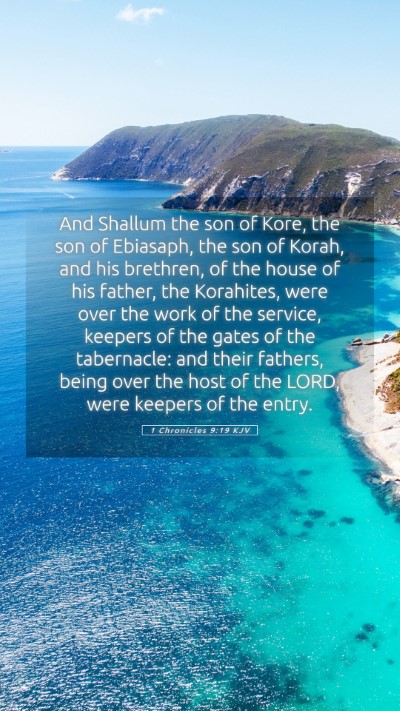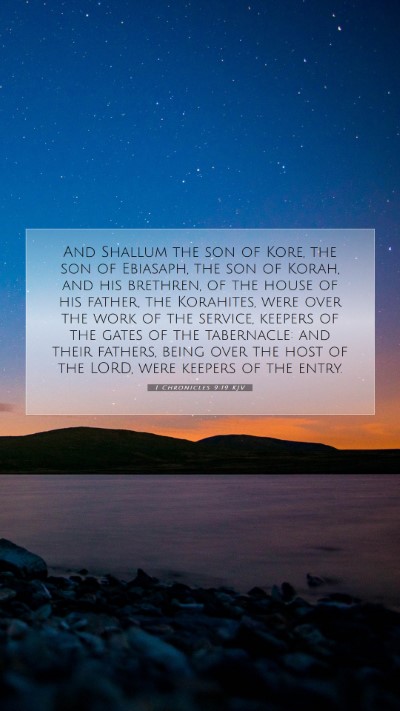Bible Verse Meaning: 1 Chronicles 9:19
Bible Verse: 1 Chronicles 9:19 (KJV) - "And Shallum the son of Kore, the son of Ebiasaph, the son of Korah, and his brethren, of the house of his father, the Korahites, were over the work of the service, keepers of the gates of the tabernacle: and their fathers, being over the host of the Lord, were keepers of the entry."
Understanding 1 Chronicles 9:19
This verse highlights a significant aspect of the structure and organization within the ancient Israelite community, particularly concerning the duties assigned to the Korahites, a family line descended from Levi. The Korahites had an essential role in guarding the entrances to the tabernacle, emphasizing their devoted service.
Bible Verse Explanations
-
Historical Context:
1 Chronicles provides a genealogical record and a reflection on the Levitical cities and duties that were vital during King David's reign. The responsibilities of gatekeepers were crucial as they regulated access to the sacred spaces.
-
Role of the Korahites:
The Korahites, named after Korah, are significant for their service as gatekeepers. Initially, Korah's rebellion (Numbers 16) painted a negative image of this lineage; however, this verse reflects their restoration and vital role in worship.
-
Spiritual Significance:
The verse symbolizes the necessity of vigilance and protection over sacred duties, as the Korahites were responsible for maintaining the sanctity of worship. This speaks to a broader principle of safeguarding spiritual integrity in community life.
Bible Verse Commentary
Commentators like Matthew Henry and Albert Barnes elaborate on the duties of the Korahites. They describe how these gatekeepers were not merely ceremonial in their duties but were critical in maintaining the order and safety of Israel's worship practices. Adam Clarke's insights further delve into the responsibilities tied to lineage and the honor associated with such service to God.
Insights from Commentaries
-
Matthew Henry:
He emphasizes the honor of being involved in the service of the Lord, reflecting on the importance of each role in God’s plan, and notes how their lineage was both a privilege and a testament to God’s faithfulness.
-
Albert Barnes:
Barnes comments on the responsibilities of the Korahites, highlighting their duty to ensure that nothing unholy entered the tabernacle and that proper worship was withheld.
-
Adam Clarke:
Clarke explains the significance of their ancestral line and how the Korahites overcame past failures to serve nobly in the worship of God.
Application of 1 Chronicles 9:19
For modern readers, understanding this verse can foster a deeper appreciation for roles within the church and community, illustrating that every service, however humble, contributes to the greater purpose of glorifying God. Just as the Korahites took pride in their responsibilities, believers today are encouraged to take seriously their commitments within their communities and churches.
Related Bible Cross References
- Numbers 16:1-35: Discusses the rebellion of Korah and its consequences.
- 1 Chronicles 9:17-18: Provides more details about the gatekeepers and their roles.
- 1 Chronicles 23:5: Details the division of labor among the Levites, including gatekeepers.
- Psalm 84:10: Speaks of the privilege of serving in God’s house over worldly pursuits.
- Hebrews 10:19-22: Emphasizes the importance of access to God through Christ, drawing a connection to the gatekeepers' role in the old covenant.
Conclusion
1 Chronicles 9:19 serves as a reminder of the power of service, duty, and heritage within spiritual frameworks. The main takeaway is that dedication to divine services not only preserves community integrity but also brings glory to God. As believers reflect on this verse, they are encouraged to engage actively in church roles, thereby promoting a vibrant and united body of Christ.


